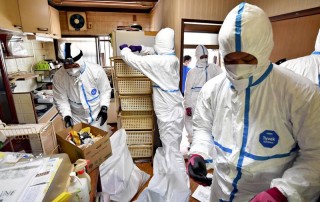Loading
Search
▼ Demand For Death Cleanup Services Soars In Japan Amid Pandemic
- Category:Other
A surge in demand for the services of companies that manage the belongings of deceased people instead of family members has turned the spotlight on the issue of solitary deaths amid the COVID-19 pandemic.
The situation has partly been attributed to a lack of opportunities for senior citizens and people who live alone to communicate with family members and volunteer welfare officials, among others.
Eight people in personal protective equipment looked for important items such as bank books in an apartment in Nishinari Ward, Osaka City, as they put magazines and clothes into trash bags and loaded them into a truck along with cupboards and chests.
The former resident was a man in his 60s who had lived alone. A city official thought something was amiss during an attempt in June to visit the man, who was receiving public welfare.
The official alerted the police, who found the man’s dead body lying on a futon. The police think he had been dead for about two months.
An urn containing the remains of the man’s older brother was found in a paper bag on the floor.
The owner of the apartment contacted the man’s relatives but they would not accept responsibility for clearing up the man’s belongings, so the landlady called Kansai Clean Service, an Osaka-based operator that clears up the belongings of the deceased.
The service cost her ¥400,000.
“It was the first time this has happened. I didn’t know what to do,” she said. “The company was a big help because they did everything from disposing of the furniture to disinfecting the apartment.”
The company charges about ¥100,000 to ¥800,000, depending on the amount of work involved.
The number of requests they have received jumped from 813 in 2019, to 1,175 in 2020, when the coronavirus started spreading in Japan. As of August, requests numbered 2,038 in 2021.
The percentage of cases that involve special cleaning because a corpse had not been discovered for a long time has almost doubled from 35% in 2019 to nearly 70% in 2020 and 2021.
“All of the cases were thought to be solitary deaths, in which the decomposition of the corpse was at an advanced stage,” a representative of the operator said. “We’re getting more requests for urgent jobs because of complaints from neighbors about such things as bad smells.”
There is no legal definition of “solitary death” and national statistics are not kept. However, Osaka Prefecture’s medical examiner’s office independently keeps data on deaths that were not discovered for at least four days.
According to the office, the number of such deaths in Osaka City grew by 12% from the previous year to 1,314 in 2020, the highest figure since tracking began in 2017.
One reason for this is thought to be a decrease in opportunities for people to interact with others.
According to a survey by a national federation of welfare and childcare officers on about 6,200 welfare officers across the country, 19.4% of respondents did not make home visits or conduct consultations from March to August last year and 66.8% made fewer visits.
“It has become more difficult for family members and welfare officers to check on people regularly, which has increased the risk of solitary death,” Katsuhiko Fujimori, senior researcher at Mizuho Research & Technologies Ltd. said.
“Some communities have sought other ways of staying in touch during the coronavirus pandemic, such as by sending letters with return envelopes to elderly people or using online services. Government bodies should support initiatives like these.”
- October 25, 2021
- Comment (0)
- Trackback(0)


